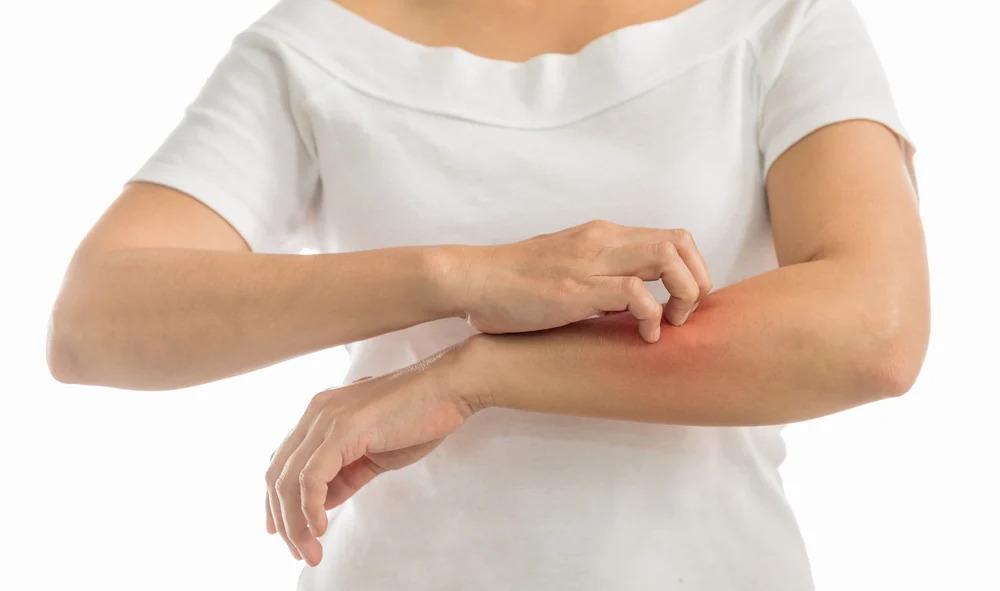What is Pruritus or Itch?
Itch, also referred to as pruritus, is an irritating sensation that provokes a desire to scratch the skin. It can occur due to various reasons, including dry skin. Dry skin, or xerosis, is characterized by a lack of moisture in the skin, leading to itchiness, tightness, and roughness. Factors like cold weather, low humidity, excessive bathing, and certain skin conditions can contribute to dry skin and trigger itchiness. Moisturizing the skin, avoiding harsh soaps, and identifying and addressing underlying causes are common approaches to managing itch and dry skin.

Symptoms of Itch or Pruritus
The exact cause of an itch is unknown and is a complex process. Ultimately it involves nerves in the skin responding to certain chemicals such as histamine, and then processing these signals in the brain. Pruritus can be a symptom of certain skin diseases, and sometimes a manifestation of an internal process. In other patients where there is no evidence of skin or internal disease, pruritus may be due to faulty processing of the itch sensation within the nervous system.
Common symptoms of itch include persistent itching, redness, dryness, or flaky skin. Itch can be caused by various factors such as allergies, skin conditions, insect bites, or underlying health conditions. Proper diagnosis and treatment are essential to alleviate the discomfort and address the underlying cause of itch.
Who gets Pruritus?
There are many skin diseases that may have itching associated with a rash as a prominent symptom. Examples would be hives, chicken pox, and eczema. Some skin conditions only have symptoms of pruritus without having an apparent rash. Dry skin, for example, is very common in the elderly, and can really itch (especially in the winter), with no visual signs of a rash.
Pruritus is usually secondary to subtle dry skin, but it may be a manifestation of an internal condition. Some parasitic infestations of the skin, such as scabies and lice, may be very itchy. Often the dermatologist will be able to diagnose these conditions by examining the skin. When pigmented moles itch, a dermatological opinion should be sought to exclude a malignant change in the mole. Sometimes, however, a skin scraping or a biopsy may be needed to help make the diagnosis.
There are several internal diseases that may cause itch. The most common example is kidney failure. Other types of internal diseases that may cause pruritus are some types of liver disease including hepatitis C, and thyroid disease including both hyper (too much) and hypo (too little) thyroid hormone levels.
Some blood disorders such as iron deficiency anemia, polycythemia vera, and multiple myeloma can cause itch. Occasionally, lymphomas may have pruritus as a component. Neurologic conditions such as pinched nerves and strokes also may lead to itch.
How is itch treated?
The doctor will first try to determine the cause of the itch. This will require an examination of the skin and possibly a blood test or biopsy. If the itch is from a skin disease such as hives or eczema, treatment of the skin disease itself generally relieves the itch. If the itch is from an internal disease, patients may require medication to be taken orally or occasionally may receive ultraviolet light treatments to relieve the itch.
Although there are many causes for pruritus, there are some basics which apply to most treatments. First of all, hot bathing or showering should be avoided. Only bathe in tepid or lukewarm water. Wearing light clothing, and a cool work or domestic environment all help to reduce the severity of itching.
Soaps often dry out the skin. Use mild soaps only in odour-bearing regions. After bathing, be sure to completely rinse off the soap film, pat the skin lightly, and immediately apply a moisturizing lotion or cream. For itchy conditions where blistering or weeping of the skin is present, such as chicken pox or poison ivy, taking a cool oatmeal bath, or using topical drying agents such as calamine, may be helpful. Although pruritus is an often disrupting and disabling symptom it generally responds well to treatment.



